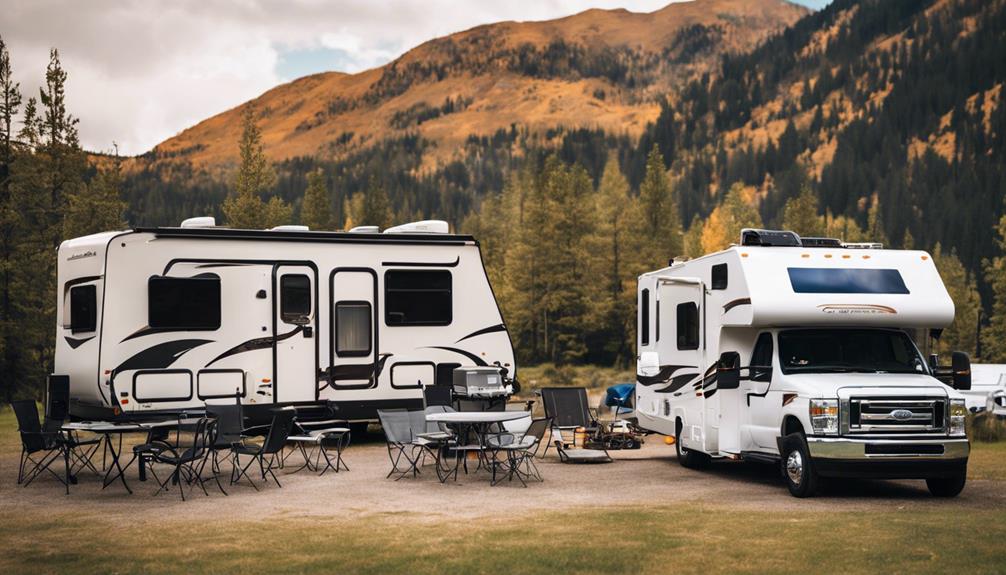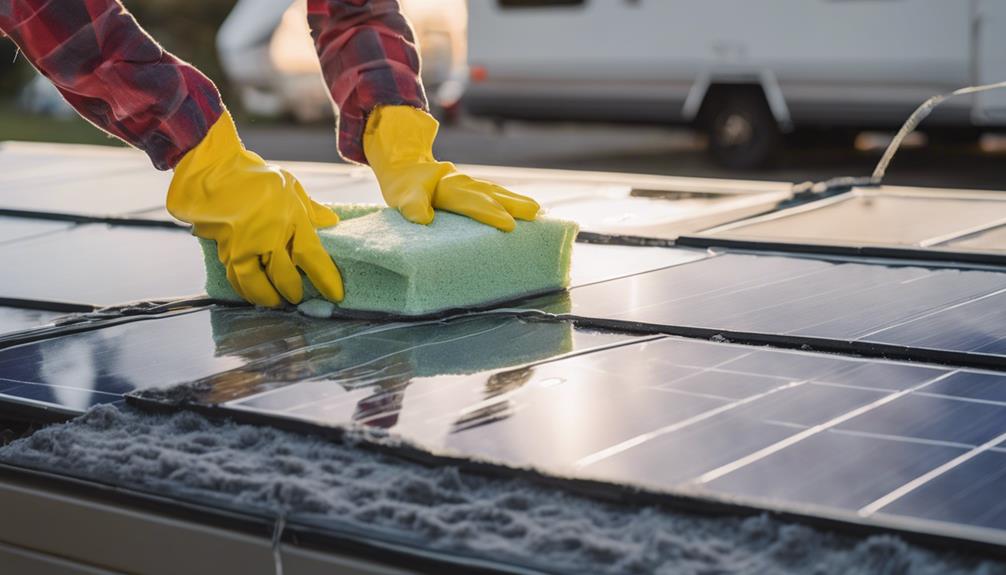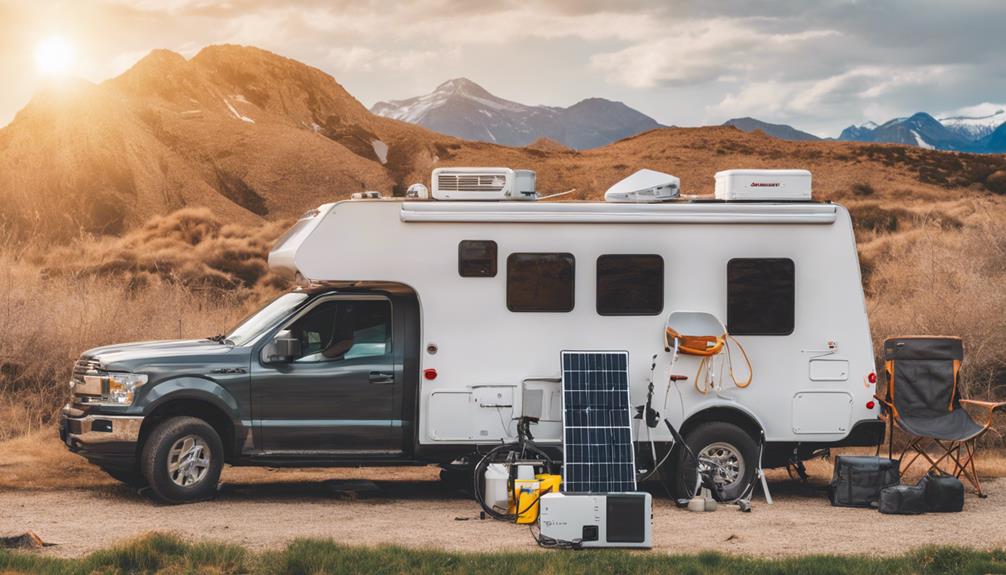When selecting solar panel kits for your RV, make sure they match your daily energy consumption and appliance wattage for peak efficiency. Consider the type of panels – Monocrystalline for high effectiveness, Polycrystalline for cost-effectiveness, or Thin-film for flexibility. Installation involves finding the right area on your roof, securing the panels, and setting up the wiring correctly. Regular maintenance, including cleaning and inspections, ensures durability. Evaluate your RV's power needs and compare kit options to make a smart investment with long-term energy savings. Get the right kit for your RV to enjoy sustainable energy and independence.
Benefits of Solar Panel Kits

Installing solar panel kits on your RV can greatly lessen your reliance on traditional power sources while providing you with a sustainable and cost-effective energy solution. One of the key benefits is the significant cost savings you can achieve in the long run. By harnessing solar energy to power your RV appliances and devices, you reduce or even eliminate the need to hook up to electrical outlets or run a generator, saving you money on fuel and campground fees. This initial investment in solar panels can translate into substantial savings over time, making it a wise financial decision.
Moreover, the environmental impact of using solar power on your RV is substantial. By utilizing clean energy from the sun, you're reducing your carbon footprint and decreasing harmful emissions that contribute to climate change. Solar panels produce electricity without producing greenhouse gases or other pollutants, making them an eco-friendly choice for powering your RV.
Embracing solar technology not only benefits your wallet but also helps protect the environment for future generations.
Types of Solar Panels
When considering solar panel kits for your RV, understanding the various types of solar panels available is important to determine the best fit for your energy needs.
Solar panels are primarily categorized based on the material they're made of – monocrystalline, polycrystalline, and thin-film.
Monocrystalline panels are known for their high efficiency and longevity. They're space-efficient, making them suitable for smaller RV roofs.
Polycrystalline panels are slightly less efficient but are more cost-effective than monocrystalline ones.
Thin-film panels are flexible and lightweight, making them ideal for curved or irregular surfaces on RVs. However, they're less efficient compared to crystalline panels.
Efficiency comparison between panel types is essential. Monocrystalline panels typically have the highest efficiency, followed by polycrystalline, and then thin-film panels.
Panel sizes also vary, affecting the total energy output. When choosing a solar panel type, consider factors such as material durability and cost analysis to make sure the best value for your RV's energy needs.
Factors to Consider

Consider the energy requirements and available roof space on your RV when evaluating solar panel kits. To achieve cost efficiency and energy savings, it's essential to match the capacity of the solar panel system with your daily energy consumption.
Assess your appliances and devices to determine the wattage needed to power them and choose a solar panel kit that can meet these demands effectively. Additionally, factor in the environmental impact of your choice.
Opting for solar power promotes off-grid living, reducing your carbon footprint while enjoying the freedom to explore remote locations without relying solely on traditional power sources. By harnessing the sun's energy, you not only save on energy costs but also contribute to a sustainable lifestyle.
When selecting a solar panel kit for your RV, prioritize both cost efficiency and environmental benefits for a rewarding off-grid experience.
Installation Guide
You should begin the installation process by locating a suitable area on your RV's roof to mount the solar panels. When determining the placement, consider factors such as shading from nearby objects and the panel's angle for best sunlight exposure. Once the mounting location is selected, secure the panels using the chosen mounting option, making sure they're firmly attached to the roof.
Next, you need to plan the wiring setup. Connect the solar panels to a charge controller to regulate the power flow to the battery storage. It's important to use appropriate gauge wires and secure all connections to prevent any electrical issues.
When installing the solar panels, consider the power output you aim to achieve. Ensure the panels are positioned to receive maximum sunlight throughout the day to optimize power generation. Additionally, monitor the battery storage capacity to match the power output for efficient energy utilization.
Maintenance Tips

Maintain regular maintenance of your RV solar panel kit to maximize performance and longevity. To ensure prime functioning, establish a cleaning schedule for your solar panels. Regularly remove dirt, dust, and debris that may accumulate on the panels, as these can hinder sunlight absorption. Utilize a mild soap solution and a soft brush to clean the surface gently.
Additionally, inspect the wiring of your solar panel kit periodically. Look for any signs of wear, loose connections, or damage that may affect the system's efficiency.
Weather protection is vital for the longevity of your RV solar panel kit. Invest in quality covers or protective coatings to shield the panels from harsh weather conditions such as rain, snow, or extreme heat. These protective measures can prevent corrosion and damage to the panels over time.
In case of any issues, utilize troubleshooting tips provided by the manufacturer to diagnose and resolve common problems promptly. By following these maintenance guidelines diligently, you can guarantee that your RV solar panel kit operates effectively for years to come.
Choosing the Right Kit
To achieve peak performance and compatibility with your RV setup, evaluating the power demands of your vehicle is necessary when selecting the right solar panel kit.
When choosing a solar panel kit for your RV, consider conducting a price comparison between different options available in the market. While upfront costs may vary, it's vital to weigh this against the long-term benefits and energy savings the kit can provide.
Energy efficiency is a key aspect to ponder when selecting a solar panel kit for your RV. Look for kits that offer high energy efficiency ratings to guarantee optimal power generation for your vehicle's requirements. By choosing a kit with superior energy efficiency, you can maximize the electricity output while minimizing wasted energy, ultimately leading to a more sustainable and cost-effective solution for your RV.
Before making a purchase, carefully assess the power demands of your RV, conduct a thorough cost comparison, and prioritize energy efficiency to make sure that you select the right solar panel kit that best suits your needs.
Frequently Asked Questions
Can Solar Panel Kits Be Used While Driving an Rv?
Yes, solar panel kits can power your RV while driving. To guarantee solar panel efficiency, connect them to your RV battery storage system. This setup enables continuous power generation, allowing you to utilize solar energy on the go.
Do Solar Panel Kits Work in All Weather Conditions?
In all weather conditions, solar panel efficiency varies. Cloudy skies or rain can lower output, impacting power generation. Snow cover can further reduce performance. Ideal conditions are sunny days for maximum efficiency.
How Long Do Solar Panel Kits Typically Last?
Solar panel kits typically last 25-30 years with proper maintenance. To extend lifespan, keep panels clean, check connections, and inspect for damage regularly. Cost benefits include reduced electricity bills. Replacement options are available if needed.
Can Solar Panel Kits Be Used to Power All RV Appliances?
Yes, solar panel kits can power all RV appliances if properly sized. Their efficiency in converting sunlight into electricity contributes to cost savings by reducing reliance on traditional power sources, making them ideal for RVs.
Are There Any Incentives for Using Solar Panel Kits in Rvs?
Using solar panel kits in RVs can bring financial benefits through tax credits, rebates, and reduced fuel costs. Additionally, they have a positive environmental impact by reducing carbon emissions and reliance on non-renewable energy sources.
Conclusion
To wrap up, solar panel kits for RVs provide numerous advantages like energy efficiency, cost savings, and environmental sustainability.
By selecting the appropriate kit considering factors such as wattage, size, and brand reputation, you can achieve peak performance for your RV.
Follow the installation guide and maintenance tips given to maximize the lifespan and effectiveness of your solar panels.
Make the transition to solar power and relish the freedom of off-grid living while traveling.
